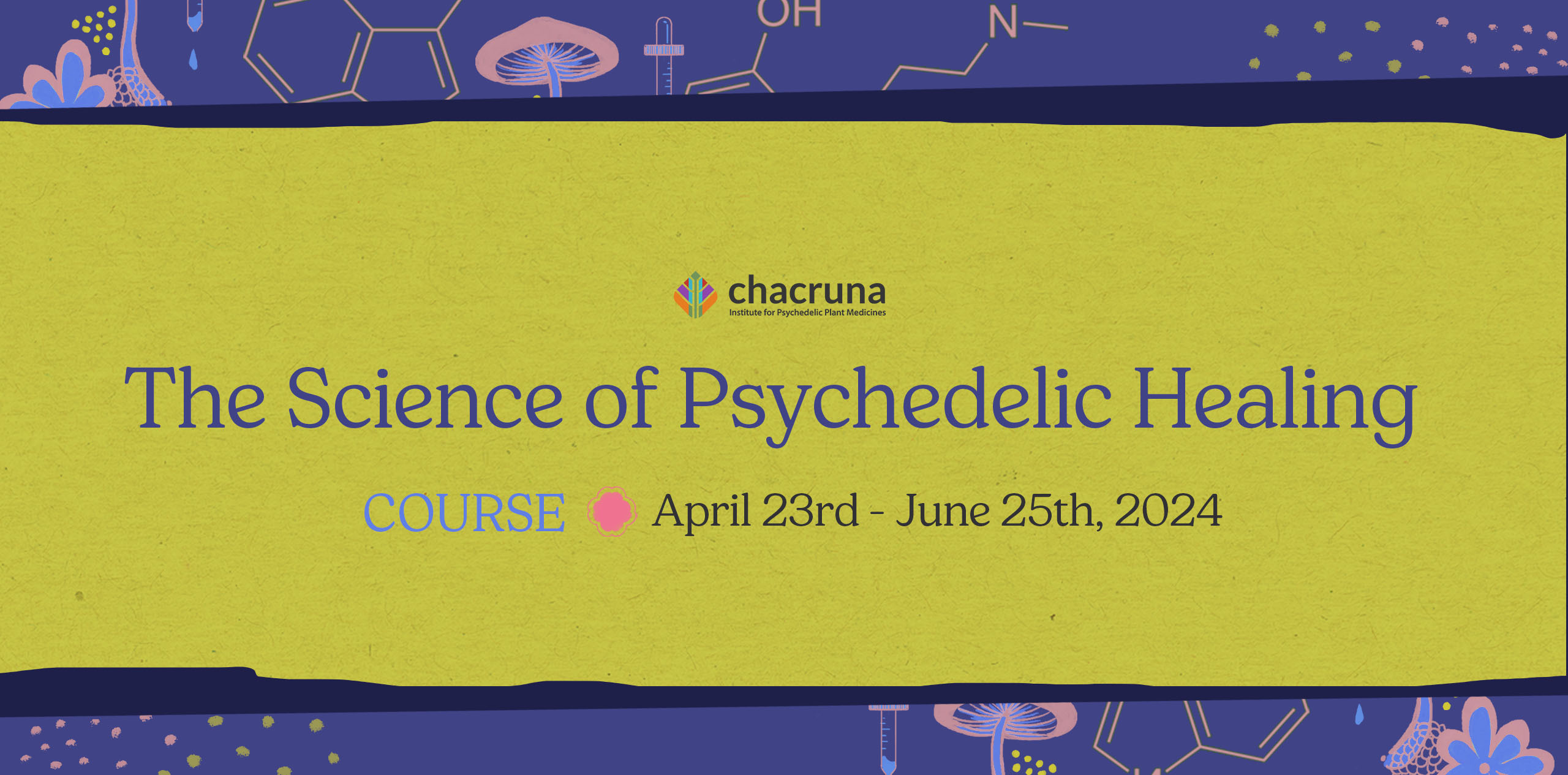- Meet Chacruna at Psychedelic Science 2025 - May 27, 2025
- Psychedelics and Attachment: Fundamentals, Implications, and New Frontiers - May 16, 2025
- Development Outreach Internship (OPEN) - May 6, 2025
April 23rd – June 25th 2024, 10:30am-12pm PST/1pm-3pm EST
Price $700 USD
Price $320 for CE credits
CE Credits Offered: 16 total
This course will teach students the science of psychedelic healing. Psychedelic-assisted therapy clinical trials have shown promise for treating a variety of behavioral health indications, and the topics covered in this course will describe some of the potential mechanisms of action for these psychedelic benefits. We will focus on specific psychoactive substances such as 5-MeO-DMT, cannabis, MDMA, psilocybin, and others. Within this realm of psychedelics, we will discuss topics such as critical periods, acute subjective effects, altered states of consciousness, characteristics of psychedelics, nervous system resilience, pharmacokinetics, pharmacodynamics, drug-drug interactions, post treatment integration, historical usage of these psychedelics and potential therapeutic applications. Evidence from psychedelic neuroscience, epidemiology and pharmacology will be presented to help students gain a greater appreciation for how psychedelics may impact health and wellness in clinical care. We will analyze different scientific research studies and data that have been presented within these realms in order to discuss therapeutic efficacy. We will ultimately strive to bridge the gap between the use of these psychedelics within western medical practice to recreational and Indigenous use.
Student Learning Objectives
At the end of the program, participants will be better able to…
- Identify the rationale and methods for incorporating acceptance and commitment therapy (ACT) and targeting psychological flexibility in psychedelic treatment models
- Analyze study data on psilocybin-assisted therapy for major depression
- List the two main cannabinoids found in the cannabis plant and discuss some of their differences
- Discuss how using psychoactive plant medicines from different regions and cultures during the same ceremonial use or over a specific period of time can support the individual on their healing journey
- Describe the historical and cultural use of 5-MeO-DMT containing plants and animals
- Analyze 5-MeO-DMT’s therapeutic potential
- Compare the differences in psychedelic psychopharmacology by mechanism of action
- Describe the adverse effects related to each psychedelic by receptor pharmacology
- Define what ayahuasca is and its effects
- Describe neurobiological changes caused by ayahuasca on the brain
- Discuss the role of the entourage effect in the therapeutic use of psychedelics
- Analyze how one-dimensional research designs focusing solely on drug dose may miss most of the desired outcomes
Information on Continuing Education Credits for Health Professionals
- CE credits for psychologists are provided by the Spiritual Competency Academy (SCA) which is co-sponsoring this program. The Spiritual Competency Academy is approved by the American Psychological Association to sponsor continuing education for psychologists. Spiritual Competency Academy maintains responsibility for this program and its content.
- The California Board of Behavioral Sciences accepts CE credits for LCSW, LPCC, LEP, and LMFT license renewal for programs offered by approved sponsors of CE by the American Psychological Association.
- LCSW, LPCC, LEP, and LMFTs, and other mental health professionals from states other than California need to check with their state licensing board as to whether or not they accept programs offered by approved sponsors of CE by the American Psychological Association.
- SCA is approved by the California Board of Registered Nursing (BRN Provider CEP16887) for licensed nurses in California. RNs must retain their certificate of attendance for 4 years after the course concludes.
- For questions about receiving your Certificate of Attendance, contact [email protected]
For questions about CE, contact Spiritual Competency Academy at [email protected].
CE Credit Requirements
- Student must be in attendance with their camera on for the entirety of the class session
- Student must be actively participating in the class session (asking questions, contributing to discussion, etc.)
- Student must fill out an evaluation and assessment form at the end of the course, which will be provided by Chacruna
- Collective CE credits will be awarded at the end of the course given that all of the above requirements are met
*please note that you must purchase a ticket for CE credits on Eventbrite in order to receive CE credits
*please note that if you miss a class, you will not be awarded any CE credits for the entire course and cannot be refunded for the CE cost – you must attend all classes in order to receive CE credits
*please note that the first and last class do not count towards CE credits
Class Recordings and Lecture Slides Policy
Recordings of the lectures will be sent to the students a week before the class is scheduled to take place.
Lecture slides from the classes may be provided to the students at each professor’s discretion. We encourage everyone to come to each class in-person and on time as we cannot guarantee providing these resources in all circumstances.
You can find more information to Frequently Asked Questions here.
Course Structure
- Students will watch the lecture on their own time
- There will be a live 1.5 hour discussion on Zoom with the professor the following week
Refund Policy click here
Classes
Click on the class to read the description
Class One – Introduction
Tuesday, April 23rd, 2024, 10:30am–12pm PST/1pm-3pm EST
Professors: Dr. Bia Labate and Dr. Ligia Platero
In this initial class, students will introduce themselves to others in the course, be introduced to the professors and their backgrounds, and gain an understanding of the curriculum and program. Students will leave with preparation for the following classes being taught and a general understanding of the topics that will be discussed throughout the course.
Class Two – The importance of set and setting in the psychedelic experience: An Anthropological Approach
Tuesday, April 30th, 2024, 10:30am–12pm PST/1pm-3pm EST
Professors: Bia Labate, Ph.D and Henrique Antunes, Ph.D
The idea behind set and setting is that the effects of psychedelic drugs are highly influenced and cannot be dissociated from the set — which involves personal history and background, as well as the expectations and intentions of the person having the experience — and setting, which includes the physical, social, and cultural environment in which the experience takes place. This class will address the emergence of the concepts of set and setting from a historical point of view and problematize some popular assumptions that underline them. In the last decades, these categories have become widely accepted both within the medical community as well as in the general public. Despite growing interest, the issue in question is not new to the humanities, especially anthropology. For decades, anthropologists have been demonstrating the importance of context — understood here, in a broad sense, as aesthetic, historical, social, economic, and cultural manifestations — as a crucial factor in the ways in which drugs are experienced. Anthropological discourse has elaborated a critique of the hegemonical biomedical scientific models which insist on separating “effects” from context. Researchers have also discussed how pharmacological reductionism informs both public notions around psychedelics and the global drug policy legal framework. Besides these topics, the class will also map the main academic debates, critiques, and alternatives offered to the drug-setting theoretical model. It will further analyze controversies around the placebo effect, randomized controlled trials, and the critique of these trends as “pharmacologism” and “colonial techniques.” It is hoped this class will help promote a critical view of the epistemological clashes between medical and social sciences, and between academic and traditional knowledge. By bringing healthcare professionals and practitioners of psychedelic-assisted therapy closer to these reflections, we hope to mitigate the unequal power relations that these fields engender and sustain in the so-called psychedelic renaissance.
Class Three – The Role of Psychological Flexibility in Psilocybin-assisted Therapy of Major Depression
Tuesday, June 7th, 2024, 10:30am–12pm PST/1pm-3pm EST
Professor: Dr. Jordan Sloshower
Psilocybin-assisted therapy is demonstrating significant therapeutic potential across numerous neuropsychiatric conditions, including depressive disorders. As a treatment for depressive disorders, growing evidence is suggestive of sustained antidepressant effects from a limited number of doses. This class will address the methods and clinical results of an exploratory placebo-controlled, fixed order study of psilocybin-assisted therapy among individuals with moderate to severe major depression (n=19). It will highlight how this study uniquely integrated elements of Acceptance and Commitment Therapy (ACT) with psilocybin treatment to target psychological flexibility. Relevant results from the clinical trial will be shared along with reflections on methodological challenges facing the field of psychedelic medicine.
Class Four – 5-MeO-DMT: history, traditional use, pharmacology, epidemiology and phenomenology
Tuesday, June 14th, 2024, 10:30am–12pm PST/1pm-3pm EST
Professor: Dr. Anna (Anya) Ermakova
This course will explore the history and science behind 5-methoxy-dimethyltryptamine (5-MeO-DMT), a naturally occurring tryptamine psychedelic found in a variety of plants and most notably toad Incilius (formerly Bufo) alvarius. Plants containing 5-MeO-DMT have been used throughout history for ritual and spiritual purposes. While 5-MeO-DMT is considered a classic psychedelic, and bears some similarity to other short-lasting tryptamines, surprisingly little scientific research has explored its mechanisms of action in humans. In fact, so far only one clinical trial in healthy volunteers has been published, indicating the safety of up to 18mg of vapourised 5-MeO-DMT. However, there is growing recreational/spiritual use of both synthetic 5-MeO-DMT as well as toad ‘venom’. I summarise current state of knowledge on 5-MeO-DMT, reviewing its pharmacokinetics, pharmacodynamics, and epidemiological research of recreational/spiritual use, and review this compound’s fascinating properties and potential therapeutic applications.
Class Five – Psychedelic adverse effects and drug-drug interactions: understanding potential risks and benefits of psychedelic therapy
Tuesday, June 21th, 2024, 10:30am–12pm PST/1pm-3pm EST
Professor: Dr. Anna (Anya) Ermakova
As psychedelic therapy advances closer to regulatory approval, it becomes increasingly important to recognize the potential risks of psychedelic adverse effects and drug-drug interactions with available psychiatric medications. This class will provide a background in psychedelic psychopharmacology and summarize the relevant pharmacokinetic and pharmacodynamic evidence from clinical trials. The class will also describe important preclinical toxicology data, epidemiologic studies, and case reports that provide even further evidence regarding the potential risks and benefits of psychedelic microdosing and macrodosing.
Class Six – Current Research Findings of MDMA-Assisted Therapy for PTSD Clinical Trials
Tuesday, June 28th, 2024, 10am–12pm PST/1pm-3pm EST
Professor: Dr. Sara J. Garcia Velasquez
This class will present a brief history of the MDMA molecule and its use as an adjunct medicine for therapy. Recognizing that chronic post-traumatic stress disorder (PTSD) continues to be a profoundly challenging condition with few effective treatments, we also will review the information currently available from the results of the first FDA-approved phase 3 MAPS clinical trial of MDMA-assisted therapy for patients with chronic PTSD and how these results open the door to a potentially powerful new pathway toward healing. This class will include an overview of the DSM-5 criteria for diagnosing PTSD and how MDMA is used to treat this in clinical trials (which differ from clinical settings), as well as the story of how MDMA came to be used therapeutically. It will also review the pharmacology and mechanism of action of MDMA, and how it facilitates a reduction of conditioned fear responses, leading to more open and comfortable communication about past traumatic events without the patient becoming overwhelmed. Additionally, this class will examine a description of the clinical trial settings, protocol design, elements of MDMA assisted-therapy, participant demographics, the importance of diverse populations in research, as well as current challenges, causes of trauma history in the studied population, safety (adverse effects, risks, and clinical considerations), efficacy, conclusions, and limitations of the clinical trials.
Class Seven – The Science of Ayahuasca
Tuesday, July 4th, 2024, 10:30am–12pm PST/1pm-3pm EST
Professor: Fernanda Palhano, Ph.Dm and Lucas Maia, PhD
This class will explore the definition, effects, and neurobiological changes induced by ayahuasca, a powerful psychedelic plant medicine. Participants will delve into the origins and cultural significance of ayahuasca, understanding its historical use and the rituals associated with its consumption. The class will examine the effects of ayahuasca on consciousness, perception, and emotions, shedding light on the interaction between its active compounds and neurotransmitter systems in the brain. Moreover, the class will focus on the neurobiological changes caused by ayahuasca, utilizing brain imaging studies to investigate alterations in neural networks and connectivity patterns. The therapeutic potential of ayahuasca, including its applications in mental health disorders, will also be explored. This class will provide a clear understanding of ayahuasca and its effects, as well as the underlying neurobiological mechanisms, enabling a deeper appreciation of this ancient plant medicine and its multiple therapeutic uses.
Class Eight – How can the psychedelic past inform the future? A historical look at different psychedelic cultures and their legacy in the renaissance
Tuesday, July 11th, 2024, 10:30am–12pm PST/1pm-3pm EST
Professor: Dr. Erika Dyck
Although the word psychedelic was only introduced in 1956, the idea of mind-altering, and even mind-manifesting, experiences have long been with us. Historically the desire to achieve different states of consciousness have emerged from rituals and ceremonies, as well as by ingesting chemicals to trigger visions or set one on a path of deep reflection. Our 21st fascination with resurrecting psychedelics might then suggest that we are culturally in need of healing, or that we are searching for answers that are not readily apparent. Existential questions about climate change, gender relations, and access to genuine information have cultivated a culture of fear and mistrust that has left us searching for meaning. This cultural experience is not unique to our times. In this lecture I explore some of the psychedelic approaches that flourished in the past, from Indigenous ceremonies, to pharmaceutical experimentation, and countercultural critiques of mainstream society. Using historical examples, I urge us to consider what kinds of information and stories we trust as we consider our future relationship with psychedelics.
Class Nine – The Science and Clinical Efficacy of Cannabis
Tuesday, July 18th, 2024, 10:30am–12pm PST/1pm-3pm EST
Professor: Dr. Sidarta Ribeiro
The field of cannabis as medicine has come a long way from its original use as a palliative tool. The last few decades have uncovered a rich and new understanding of the breadth of cannabinoids found in the plethora of cannabis chemovars. The interaction of specific cannabinoids with the suite of terpenes found in the cannabis flower is what gives the plant its potency as well as its flexibility in treating a wide array of conditions. The Endocannabinoid System (ECS) was first identified in the 1990s as a means of self-regulation and achieving homeostasis. It helps the mind and body find a middle ground and supports resilience. A novel approach to working with, and understanding the many facets of cannabis, is learning how to support and nourish the ECS in order to build internal resilience and resistance to unwanted change. In this course we will examine and identify ways to work with lower, non psychoactive doses, of cannabis in order to support our ability to be flexible in a changing world. We will also address the concept of using cannabis to provide nervous system resilience in the face of larger doses of more psychoactive substances. Specifically, we will examine the potential, and traditionally controversial topic, of using low dose cannabis between sessions of the ritual consumption of ayahuasca.
Class Eight – Conclusion
Tuesday, July 25th, 2024, 10:30am–12pm PST/1pm-3pm EST
Professor: Dr. Bia Labate and Dr. Ligia Platero
In this final class, we will strive to summarize everything taught throughout the course. In doing so, we will recap the main concepts, highlight the main moments, and give folks a chance to voice any significant takeaways about the topics discussed. We will also do a critique of the course and think of ways to improve it for future teachings.
Professors
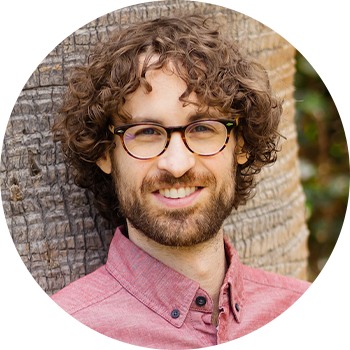
Jordan Sloshower, MD, MSc is a psychiatrist, researcher, and educator whose work focuses on therapeutic applications of psychedelic medicines, and in particular, how these novel treatments can be delivered in a manner that promotes holistic healing and social justice. He is co-director of West Rock Wellness, PLLC and a clinical instructor in the Yale Department of Psychiatry, where he co-founded the Yale Psychedelic Science Group and served as an investigator and therapist in several clinical trials of psilocybin-assisted therapy. Jordan is also a clinical investigator in MAPS’ Expanded Access Program for MDMA-assisted therapy of PTSD and serves as a trainer with Usona Institute’s psilocybin facilitator training program. Reflecting his commitment to ethical stewardship of psychedelic medicines, Jordan was elected to the Board of Directors of the American Psychedelic Practitioners Association and serves as a member of Chacruna Institute’s Council for the Protection of Sacred Plants. Jordan’s interdisciplinary perspective is informed by prior training in medical anthropology and global health, and deep interests in ceremonial uses of plant medicines, Buddhist philosophy, and integrative approaches to wellness.
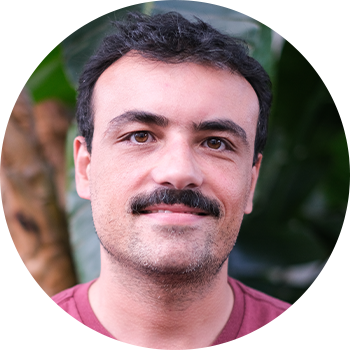
Dr. Henrique Fernandes Antunes has a Ph.D. in anthropology from the University of São Paulo (2019), with a research internship as a visiting scholar at the University of California, Berkeley. He was a postdoctoral fellow at the Centre d’Étude des Mouvements Sociaux (CEMS) of the École des Hautes Études en Sciences Sociales (EHESS), at the Department of Classics and Religious Studies of the University of Ottawa, and at the International Postdoctoral Program of the Brazilian Center of Analysis and Planning (CEBRAP). He holds a master’s degree in anthropology from the University of São Paulo (2012), and a bachelor in social sciences (2006) and anthropology (2008) from the Universidade Estadual Paulista Júlio de Mesquita Filho (UNESP-FFC). He is a member of the research group Religion in the Contemporary World at the CEBRAP. He is also a researcher at the Interdisciplinary Group for Psychoactive Studies (NEIP). Dr. Antunes specializes in the fields of urban anthropology, anthropology of religion, anthropology of secularism, and sociology of public problems. He is Ayahuasca Community Committee Coordinator at the Chacruna Institute for Psychedelic Plant Medicines.
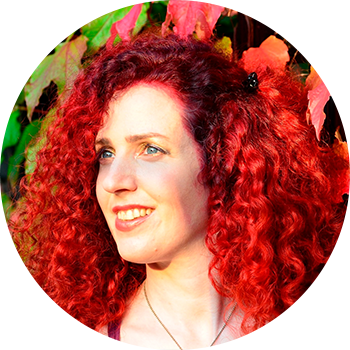
Anna (Anya) Ermakova has a motley background and broad research interests combining nature conservation, ethnobotany, neuroscience and psychiatry, interweaving and connecting these diverse paths through psychedelic science. Anya worked at the forefront of psychedelic research as a science officer at the Beckley Foundation, and has provided psychedelic welfare and harm reduction services with PsycareUK and Zendo. Deep love for nature and wildlife has motivated Anya to study biology at the University of Edinburgh, while a quest to understand altered states of consciousness has prompted her to specialise in neuroscience and later continued during her PhD in psychiatry at Cambridge, where she investigated the origins of psychosis. She then worked for the NHS, developing and trialing a new psychosocial intervention for psychosis. After a brief stint as a clinical trial manager, she had decided to pursue her passion for nature, by studying Conservation Science at Imperial College London, where she researched peyote ecology in Texas, USA. Anya is working as a research consultant in London, is a member of the Board of Directors of the Chacruna Institute for Psychedelic Plant Medicines, and member of Chacruna’s Council for the Protection of Sacred Plants. She is also a board member of the Cactus Conservation Institute.
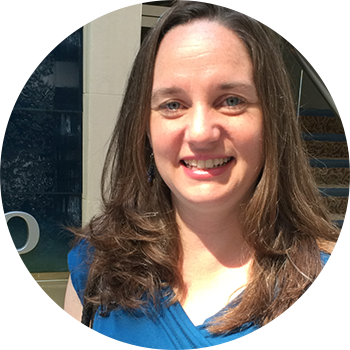
Erika Dyck is a Professor and a Canada Research Chair in the History of Health & Social Justice at the University of Saskatchewan. She is the author or co-author of several books, including: Psychedelic Psychiatry (2008); A Culture’s Catalyst: Historical Encounters with Peyote and the Native American Church in Canada (2016); Psychedelic Prophets: The Letters of Aldous Huxley and Humphry Osmond (2018); Mujeres y Psicodélicos (2022) and co-author of The Acid Room: the psychedelic trials and tribulations of Hollywood Hospital (2022). She sits on the Board of Directors of the Chacruna Institute for Psychedelic Plant Medicines and is Associate Director of Chacruna in Canada.
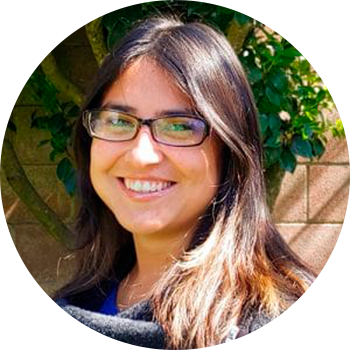
Sara J. Garcia Velazquez, M.D, is a general physician who obtained her medical degree from the University of the State of Michoacan in Mexico in 2012. In 2009, after finishing her medical internship at a state hospital, Sara worked as the lead social service physician in rural areas of Mexico for the Mexican Board of Health. In 2013 she moved to the Bay Area, where she studied music at the Pyramind Studios for two years. In 2016, she joined the San Francisco Clinical Research Center, where she gained valuable clinical and research experience as a clinical research coordinator and cognitive rater. She spearheaded protocols in the therapeutic areas of mild Cognitive Impairment, Alzheimer’s disease, Parkinson’s, Cluster Headache, Migraine, and Persistent Posttraumatic Headache. Sara continued her clinical research journey in 2018 at Science 37, a telemedicine and mobile technology company specializing in virtual clinical trials. In 2020 she joined the MAPS PBC team as a Medical Monitor, applying her experience and passion for biomedical knowledge to bring psychedelic medicine to all patients. In 2021 she was promoted to Associate Medical Director and continues to perform medical monitoring activities, ensuring the safety of clinical trial participants, and actively participates in the MAPS PBC diversity working group striving towards diversity, inclusion, and access to Psychedelic Medicine and clinical trials.
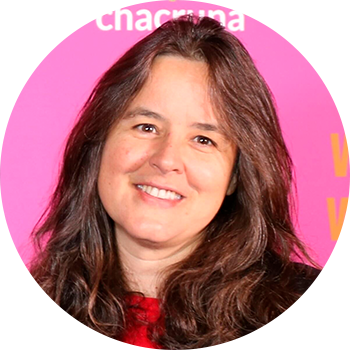
Dr. Beatriz Caiuby Labate (Bia Labate) is a queer Brazilian anthropologist based in San Francisco. She has a Ph.D. in social anthropology from the University of Campinas (UNICAMP), Brazil. Her main areas of interest are the study of plant medicines, drug policy, shamanism, ritual, religion, and social justice. She is Executive Director of the Chacruna Institute for Psychedelic Plant Medicines and serves as Public Education and Culture Specialist at the Multidisciplinary Association for Psychedelic Studies (MAPS). She is also Visiting Scholar at the Graduate Theological Union in Berkeley. Additionally, she is Advisor for the Veteran Mental Health Leadership Coalition and the Soltara Healing Center. Dr. Labate is a co-founder of the Interdisciplinary Group for Psychoactive Studies (NEIP) in Brazil and editor of its site. She is author, co-author, and co-editor of twenty-eight books, three special-edition journals, and several peer-reviewed articles (https://bialabate.net).
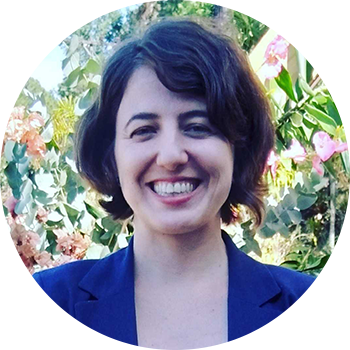
Lígia Duque Platero is Chacruna’s Education Program Associate. She is a queer, cisgender Brazilian woman. She has an interdisciplinary background in history, anthropology and Latin American studies. She holds a bachelor’s degree in history (2005) and a history teacher training qualification (2006) from the University of São Paulo (USP), in Brazil. She has a master’s degree in Latin American Studies from the National Autonomous University of Mexico (UNAM – 2012) in Mexico City, addressing public policies in relation to Indigenous peoples and Indigenous education in Brazil and Mexico from the 1940s-1970s. She has a doctorate in humanities, with an emphasis on cultural anthropology (2018), from the Federal University of Rio de Janeiro (UFRJ), in Brazil. Her PhD looked at the cultural transformations and exchanges amid the alliance between the Yawanawá Indigenous people and an urban church of Santo Daime. Her main research focus areas are: ayahuasca, Santo Daime, sacred plants, shamanic tourism, Yawanawá (Pano) people, Indigenous policies and human rights in Brazil and Mexico. She is a research associate at the Interdisciplinary Group for Psychoactive Studies (NEIP) and at the Laboratory for the History of Religious Experiences (UFRJ/IFCS) in Brazil.
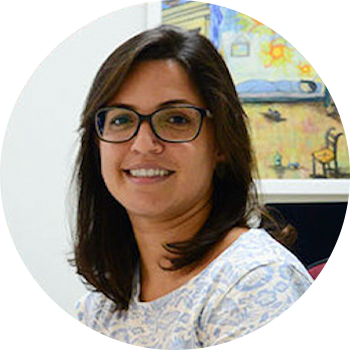
Dr. Fernanda Palhano-Fontes is an electrical engineer with double degrees: one from the Federal University of Rio Grande do Norte (UFRN), Natal, Brazil, and another from the École Nationale Supérieure d’Electrotechnique, d’Electronique, d’Informatique (ENSEEIHT), Toulouse, France. She earned a master’s degree and a PhD in Neurosciences from the Brain Institute of UFRN. In the masters program, she used functional magnetic resonance imaging (fMRI) to evaluate the acute effect of ayahuasca on healthy individuals. In her doctoral thesis, she investigated the therapeutic potential of ayahuasca in patients with treatment-resistant depression. Fernanda Palhano-Fontes is currently a research engineer at the Brain Institute of UFRN. Her main areas of interest are psychedelics, psychiatry, and imaging techniques such as fMRI and electroencephalography.
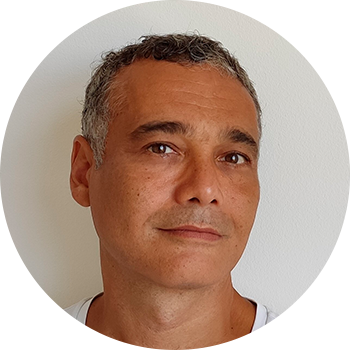
Sidarta Ribeiro is a Full Professor of Neuroscience and co-founder of the Brain Institute at the Universidade Federal do Rio Grande do Norte, Brazil. He holds a Bachelor’s degree in Biology from the Universidade de Brasília (1993), a Master’s degree in Biophysics from the Universidade Federal do Rio de Janeiro (1994), and a Ph.D. in Animal Behavior from the Rockefeller University (2000), with post-doctoral studies in Neurophysiology at Duke University (2005). Has experience in neuroethology, molecular neurobiology, and systems neurophysiology, with an interest in the following subjects: memory, sleep, and dreams; neuronal plasticity; vocal communication; symbolic competence in non-human animals; computational psychiatry; neuroeducation; psychedelics and drug policy. He is also involved in the public debate on medicinal uses and the legalization of cannabis in Brazil. He sits on the Advisory Board of the Chacruna Institute for Psychedelic Plant Medicines.
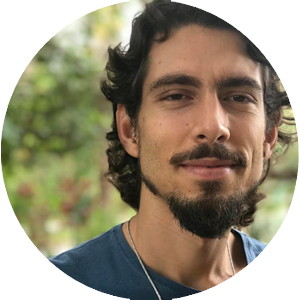
Lucas Maia is a Brazilian psychopharmacologist who has been studying the therapeutic potential of psychedelics, especially ayahuasca, for about 15 years. He holds a Ph.D. in mental health from the University of Campinas (Unicamp) and an M.Sc. in psychopharmacology from the Federal University of Sao Paulo (Unifesp). Currently, he serves as a postdoctoral researcher at the Brain Institute of the Federal University of Rio Grande do Norte (UFRN) and as a research associate at the Interdisciplinary Cooperation for Ayahuasca Research and Outreach (ICARO – Unicamp). His research focuses on understanding the psychological mechanisms that underlie the therapeutic effects of ayahuasca in treating psychiatric disorders and existential suffering among individuals with life-threatening illnesses. Additionally, he is a co-founder of the Brazilian scientific dissemination portal known as ‘Ciência Psicodélica’ (cienciapsicodelica.com.br).
Take a minute to browse our stock:
Did you enjoy reading this article?
Please support Chacruna's work by donating to us. We are an independent organization and we offer free education and advocacy for psychedelic plant medicines. We are a team of dedicated volunteers!
Can you help Chacruna advance cultural understanding around these substances?


